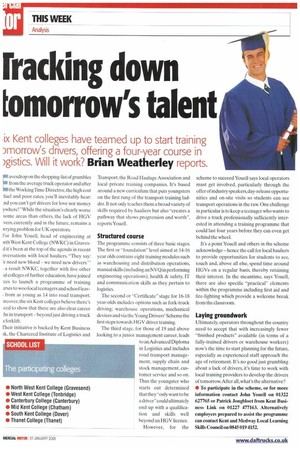['racking down tomorrow's talent
Page 20

If you've noticed an error in this article please click here to report it so we can fix it.
ix Kent colleges have teamed up to start training morrow's drivers, offering a four-year course in
)gistics. Will it work? Brian INeatherley reports.
Eavesdrop on the shopping-list of grumbles from the average truck operator and after the WorkingTime Directive, the high cost fuel and poor rates, you'll inevitably hear: .nd you can't get drivers for love nor money ywhere!" While the situation's clearly worse some areas than others, the lack of HGV [vers. currently and in the future, remains a irrying problem for UK operators.
For John Youell, head of engineering at irth West Kent College (NWKC) in Gravesd its been at the top of the agenda in recent nversations with local hauliers. "They say: 'e need new blood — we need new drivers.'" a result NWKC, together with five other :al colleges of further education, have joined .ces to launch a programme of training Jrses to woo local teenagers and school leav, from as young as 14 into road transport. neover, the six Kent colleges believe there's eed to show that there are also clear career :hs in transport — beyond just driving a truck a forklift.
['heir initiative is backed by Kent Business ik, the Chartered Institute of Logistics and Transport, the Road Haulage Association and local private training companies. It's based around a new curriculum that puts youngsters on the first rung of the transport training ladder. It not only teaches them a broad variety of skills required by hauliers but also "creates a pathway that shows progression and worth", reports Youell.
Structured course
The programme consists of three basic stages. The first or "foundation" level aimed at 14-16 year olds contains eight training modules such as warehousing and distribution operations, manual skills (including an NVQ in performing engineering operations), health & safety, IT and communication skills as they pertain to logistics.
The second or "Certificate" stage for 16-18 year-olds includes options such as fork-truck driving; warehouse operations, mechanical devices and via the Young Drivers' Scheme the first steps towards HGV driver training.
The third stage. for those of 19 and above looking to a junior management career, leads to an Advanced Diploma in Logistics and includes road transport management, supply chain and stock management, customer service and so on. Thus the youngster who starts out determined that they"only want to be a driver" could ultimately end up with a qualification and skills well beyond an HGV licence. scheme to succeed Youell says local operators must get involved, particularly through the offer of industry speakers, day-release opportunities and on-site visits so students can see transport operations in the raw. One challenge in particular is to keep a teenager who wants to drive a truck professionally sufticiently interested in attending a training programme that could last four years before they can even get behind the wheel.
It's a point Youell and others in the scheme acknowledge — hence the call for local hauliers to provide opportunities for students to see, touch and, above all else, spend time around HG Vs on a regular basis, thereby retaining their interest. In the meantime, says Youell, there are also specific "practical" elements within the programme including first aid and fire-fighting which provide a welcome break from the classroom.
Laying groundwork
Ultimately, operators throughout the country need to accept that with increasingly fewer "finished products" available (in terms of a fully-trained drivers or warehouse workers) now's the time to start planning for the future, especially as experienced staff approach the age of retirement. It's no good just grumbling about a lack of drivers, it's time to work with local training providers to develop the drivers of tomorrow.Aftcr all, what's the alternative?
• To participate in the scheme, or for more information contact John Youell on 01322 627765 or Patrick Jongbloet from Kent Business Link on 01227 477163. Alternatively employers prepared to assist the programme can contact Kent and Medway Local Learning Skills Council on 0845 019 4152.


































































































































































































